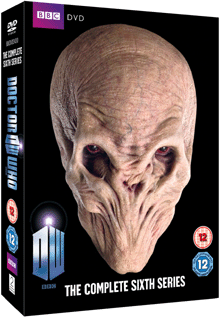 Questions have been answered, only to be replaced with other questions, and even some answers haven’t actually been cleared up as much as they might at first appear.
Questions have been answered, only to be replaced with other questions, and even some answers haven’t actually been cleared up as much as they might at first appear.
What is clear is that this series divided fans much more than any other in recent history, with one section convinced that the series was descending into a self-involved incoherent mess, while the rest just pointed at the nation’s eight year olds (surely the only audience that actually matters) who were simply having a great time.
When it comes down to it, how much you enjoy Series 6 is down to what you believe Who actually is. If you’re not able to cope with the idea of an ancient Time Lord that used to have Jon Pertwee’s face having a healthy sex life (not actually confirmed within the series, no matter how heavily it is hinted at), then you’re likely to have a fair few problems with the show.
And if you think that the companions should be just that – companions, friends of the Doctor; that the TARDIS crew should pop onto a planet in need, save the day, move on – well, the show itself has moved significantly on from those days for quite a while.
Most troubling for a long term fan is how dramatic these changes have been in just a few recent years. When RTD rebooted the series, the Doctor was an enigmatic character whose very DNA samples confused sexy tree people as to the impossibility of his existence.
Nowadays, however, the entire universe can call out his name in an effort to save time. But perhaps that’s the point: like last year, there’s very much the sense that Moffat and co are simply clearing the decks for what is to come.
You can have as much bombast as you want right now, because soon, we’ll be ‘stepping into the shadows’. With Matt Smith’s Troughton inspirations, this looks to be very welcome, although it’s likely we’ll still have a few explosions in the mix.
The Impossible Astronaut and Day of the Moon are a good, fun opening to the series, promising great things that aren’t always delivered on throughout the following episodes. It’s not just the US setting that gives it a sense of spectacle and scale, although the location does allow it some wriggle room that other stories (the mid-season cliffhanger, for instance) seem to get crushed by.
The Curse of the Black Spot isn’t nearly as tiresome as early critics seemed to think, and has a great sense of menace and despair throughout. Neil Gaiman’s much anticipated The Doctor’s Wife is already a firm fan favourite, but is a main offender in the current crop of stories that are ‘about’ The Doctor or companions himself (as opposed to simply, an adventure).
The Rebel Flesh/The Almost People is the closest we’ve had to a Patrick Troughton story since the days of the man himself, feeling like a mix between Fury from the Deep and any number of Cybermen-in-corridors adventures.
A Good Man Goes To War, the mid-series finale, was one of the episodes that finally united the fans and the yet to be convinced, but, actually, this reviewer found it unsatisfying. After a build up of years, the reveal of River Song’s true identity and motive seemed perfunctory (something that gets even worse in the superior Let’s Kill Hitler), and there is something troubling about the Doctor sending Rory in to annihilate a Cyber Fleet without so much as a warning.
 After the summer break, we have Let’s Kill Hitler – essentially a great, glorious joke, the punchline of which is that Hitler is massively irrelevant to the plot – followed by Night Terrors, which comes across as a early-‘80s episode of Tales of the Unexpected, then an emotional double punch of The Girl Who Waited and The God Complex, the latter of which still seems to have a couple of mis-leads and clues for future writers to pick up on.
After the summer break, we have Let’s Kill Hitler – essentially a great, glorious joke, the punchline of which is that Hitler is massively irrelevant to the plot – followed by Night Terrors, which comes across as a early-‘80s episode of Tales of the Unexpected, then an emotional double punch of The Girl Who Waited and The God Complex, the latter of which still seems to have a couple of mis-leads and clues for future writers to pick up on.
Closing Time is a cute, funny breath of fresh air before the finale (and, despite misgivings, the Cybermen are much more logical a creature to have clomping under a department store than the Autons in this particular story).
As for the finale itself, The Wedding of River Song is a great closer to the series, where all the loose ends are (apparently) tied up, and the broader strokes of the earlier adventures begin to earn themselves.
Early scenes suggest that director Jeremy Hunt should be a shoo-in if the BBC ever manage to produce a series of the ‘Thursday Next’ series of books, with the clock-clocking of Dodos and steam-punk motifs sitting merrily next to ultra-modern/ancient icons. For a viewer like this one, who had generally enjoyed the series, but was always concerned that it alienating huge portions of the audience, this episode alone justified the entire season before it. And, as we’ve alluded to before, the hint that the Doctor is aware that he’s become too noticeable promises great things.
In many ways, Series 6 is all about one thing, River Song, and despite Alex Kingston’s great performance that’s generally to its detriment. Series 7 seems to be time for the story arcs to return to being part of the background, to fade into the distance.
It’s only when we know less about the lead character that he truly becomes the one we know all too well. Now, hopefully, nobody will be forced to ask the ultimate question; the question that must never be asked…
![]()
Released on DVD and Blu-ray on Monday 21st November 2011 by 2entertain.
> Buy the Series 6 DVD boxset on Amazon.
> Buy the Series 6 Blu-ray boxset on Amazon.
Watch the Series 6 trailer…

